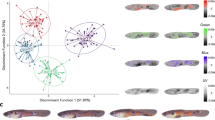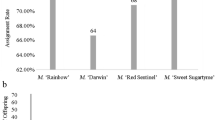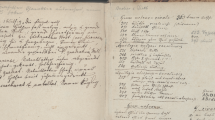Abstract
AN investigation to find the mode of inheritance of style-length in the tristylic species Oxalis articulata Savign., the gardeners' floribunda, was begun in 1949 when the genetic situation in O. valdiviensis had been established1,2. In the latter species inheritance is disomic ; there are two linked dominant genes, that for Short being epistatic to Mid, and the long-styled form is the double recessive.
This is a preview of subscription content, access via your institution
Access options
Subscribe to this journal
Receive 51 print issues and online access
$199.00 per year
only $3.90 per issue
Buy this article
- Purchase on Springer Link
- Instant access to full article PDF
Prices may be subject to local taxes which are calculated during checkout
Similar content being viewed by others
References
Fisher, R. A., and Martin, V. C., Nature, 162, 533 (1948).
Fyfe, V. C., Heredity, 4, 365 (1950).
Ubisch, G. von, Biol. Zentralblatt, 46, 633 (1926).
Author information
Authors and Affiliations
Rights and permissions
About this article
Cite this article
FYFE, V. Two Modes of Inheritance of the Short-styled Form in the ‘Genus’ Oxalis. Nature 177, 942–943 (1956). https://doi.org/10.1038/177942a0
Issue Date:
DOI: https://doi.org/10.1038/177942a0
This article is cited by
-
The inheritance of tristyly in Decodon verticillatus (Lythraceae)
Heredity (1993)
-
The inheritance of style length in Oxalis rosea
Heredity (1986)
-
Fluctuations in heteromorphic self-incompatibility systems
Theoretical and Applied Genetics (1983)
-
The genetic control of tristyly in Oxalis section Ionoxalis
Heredity (1976)
Comments
By submitting a comment you agree to abide by our Terms and Community Guidelines. If you find something abusive or that does not comply with our terms or guidelines please flag it as inappropriate.



